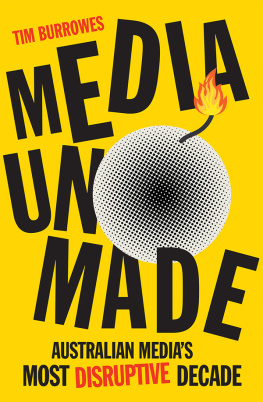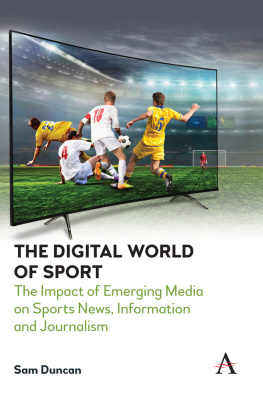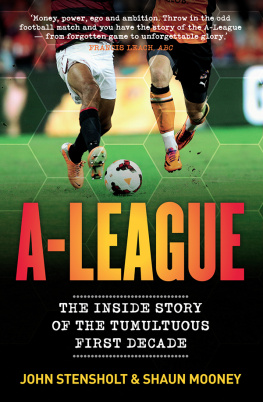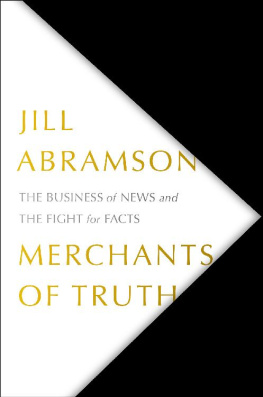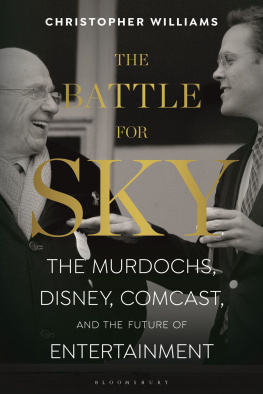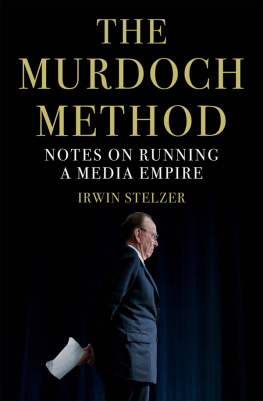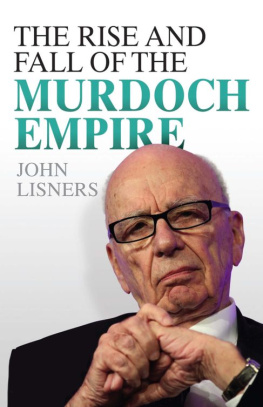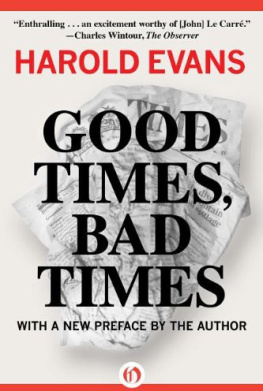In Sydney, it was the afternoon of Monday 6 December 2010. In Las Vegas it was still the weekend.
Antony Catalano was on a US holiday with his future third wife, Stefanie. They were taking a break after the busiest and most successful months in the Cats career. Back on 28 April with the backing of Victorias biggest real estate agents, his redundancy payout from The Age and a loan from Stefanie hed launched The Weekly Review in Melbourne. The glossy magazine had instantly gobbled up half of the lucrative Victorian property ads of his former employer Fairfax Media. And now the fast-talking, business-obsessed, journo-turned-entrepreneur was developing a plan to take the rest.
The Cat and Stefanie were enjoying late-night cocktails in a poolside bar at the five-star Wynn casino. They were wrapped up snugly the desert gets cold at night. It was the couples first proper break since the launch. Although things were looking good for the young business, they hadnt completely pushed the boat out theyd flown premium economy.
A few hours earlier, Catalano had read a news story on The Age website with interest. Brian McCarthy, the boss of Fairfax Media, was out. Catalanos old mentor Greg Hywood, whod returned to Fairfax as a board director just a few weeks before, was the new acting CEO.
Catalanos mobile phone rang. It was Hywood. Well, well, well, this is a surprise, Catalano told him.
Hywood came straight to the point: Im calling to fix this fuck-up youve created for us in Victoria.
Grant Blackley: CEO of Network Ten, until 2011; CEO of Southern Cross Austereo, 2015 onwards
Antony Catalano: Proprietor of The Weekly Review, 20102013; CEO of Domain, 20132018; Proprietor of Australian Community Media, 2019 onwards
Ciaran Davis: CEO of Australian Radio Network, 2010 onwards; CEO of APN News & Media/HT&E, 2015 onwards
Bruce Gordon: Proprietor of WIN Corporation; shareholder in Network Ten until 2017; ongoing shareholder in Prime Media and Nine Entertainment Co
Michelle Guthrie: MD of partner business solutions, then of agencies, at Google APAC, 20112016; MD of the ABC, 20162018
David Gyngell: CEO of Channel Nine/Nine Entertainment Co, until 2015
Jackie Henderson and Kyle Sandilands: Presenters of The Kyle & Jackie O Show, on 2Day FM, until 2013; and on Kiis FM, 2014 onwards
Rhys Holleran: CEO of Southern Cross Media, until 2011; CEO of Southern Cross Austereo, 20112015
Greg Hywood: CEO of Fairfax Media, 20102018
Chris Janz: CEO of Allure Media, until 2013; CEO of HuffPost Australia, 20152016; director of publishing innovation and MD of metro publishing at Fairfax Media, 20162018; MD of publishing, then chief digital and publishing officer at Nine, 2018 onwards
Hugh Marks: Board member, then CEO of Nine, 20132021
Michael Miller: Regional director NSW, News Limited, 20122013; CEO, APN News & Media, 20132015; executive chairman, News Corp Australia, 2015 onwards
Lachlan Murdoch: Proprietor of DMG Radio/Nova Entertainment, 2009 onwards; shareholder of Network Ten, 20102017; board director, News Corp
Rupert Murdoch: Proprietor of News Corp; proprietor of 21st Century Fox, 20132019
James Packer: Shareholder in Foxtel and Fox Sports, until 2012; shareholder of Network Ten, 20102017
Mark Scott: MD of the ABC, 20062016
Mike Sneesby: Director of strategy and business development at NineMSN, until 2010; VP of IPTV at Intigral, 20102012; CEO of Cudo, 20122013; CEO of Stan, 20132021; CEO of Nine, 2021 onwards
Kerry Stokes: Proprietor of Seven Network/Seven West Media
James Warburton: Chief sales and digital officer at Seven Network, until 2011; CEO at Network Ten, 20122013; CEO of V8 Supercars, 20132017; CEO of APN Outdoor, 2018; CEO of Seven West Media, 2019 onwards
Kim Williams: CEO of Foxtel, until 2011; CEO of News Limited/News Corp, 20112013
Tim Worner: Director of programming and production of Seven Network, until 2011; CEO of Seven Network, 20112013; CEO of Seven West Media, 20132019
INTRODUCTION
YOURE GONNA MISS US WHEN WERE GONE
You might know how this story ends. But its easy to forget how we got here as Australias media navigated its most disruptive decade. This is a story of media people being dealt bad hands and playing them as well as they possibly could, and, occasionally, brilliantly. Sometimes they altered the fate of their organisations. Sometimes, despite their best efforts, it was already too late.
Nine nearly went broke, before emerging from the decade that began in 2010 as Australias biggest media company. News Corp descended into civil war between its editors and its management before concluding that its future lay in the pockets of consumers more than advertisers. And Lachlan Murdoch took a winding path away from his father Rupert, with disaster at Network Ten and triumph at Nova Entertainment, before returning as heir apparent.
Catalysed by the mismanagement of the Bauer family, Australias magazine industry collapsed in on itself. There was a sad sense of inevitability that three of Australias most important newspaper mastheads The Age, The Sydney Morning Herald and the Australian Financial Review were on the print extinction timeline too, before they somehow figured out how to stop the clock. But there was to be no rescue of the local newspapers wiped out during Covid.
For supporters of public service broadcasting, there was the frustration of watching Mark Scott chisel out a lead for the ABC in the new digital world only to see it followed by the fumblings of his successor Michelle Guthrie, before hostility from the Coalition government put Aunty on what seemed like a permanent back foot.
Digital disruption helped break the old media business model, as classified advertising leaked away. The weaponisation of social media helped break democracy. And Australias regulators belatedly tried to confront Googles and Facebooks growing power as those tech giants took control of the plumbing and economics of the entire digital publishing ecosystem. Then came the defining day in 2021 when Facebook deleted Australian news from its News Feed.
Media habits changed entirely. Phones got smart, the ads started following us around the web, and we began streaming our music and our TV shows.
A series of new online publishers such as The Guardian, Junkee, The Conversation and the Daily Mail found local niches, while others like BuzzFeed, The Global Mail, The Punch and Huffington Post struggled. New fortunes were made, thanks to bubbles like group buying and content marketing, and to emerging trends such as the second coming of outdoor advertising and the rise of social media influencers. The entrepreneurial Antony Catalano elbowed his way in as the decades newest media mogul.
There was the shock of a silly prank call by two radio presenters leading to a suicide, and the beginning of 2Day FMs decline. And Australias commercial radio landscape was remade when Kyle Sandilands and Jackie Henderson defected to new station Kiis FM.
It was a decade of unending rounds of redundancies for media workers, made all the worse when the Covid recession stopped the advertising market in its tracks and wiped out more than 1000 media jobs.
But what you may not know is how it all happened. I watched the change from up close. I once was a print journo Im old enough to have done my cadetship with a manual typewriter before, much later, being seduced by the world of blogging. I was close to the action, covering the beat for my media and marketing website

